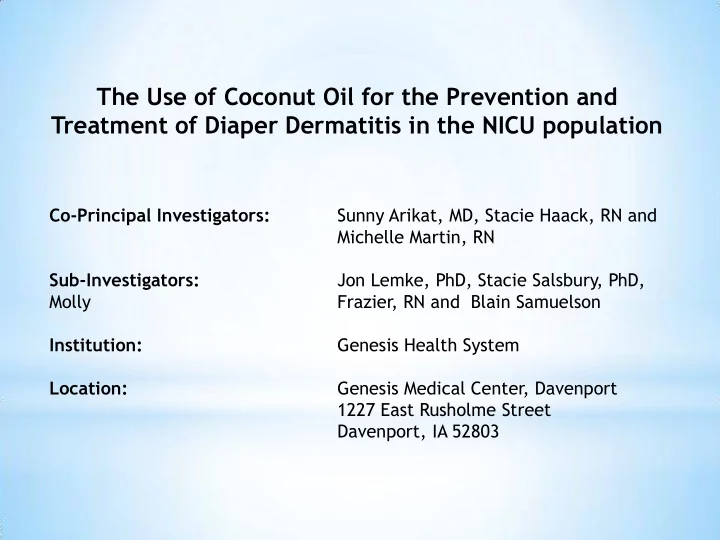

The Use of Coconut Oil for the Prevention and Treatment of Diaper Dermatitis in the NICU population Co-Principal Investigators: Sunny Arikat, MD, Stacie Haack, RN and Michelle Martin, RN Sub-Investigators: Jon Lemke, PhD, Stacie Salsbury, PhD, Molly Frazier, RN and Blain Samuelson Institution: Genesis Health System Location: Genesis Medical Center, Davenport 1227 East Rusholme Street Davenport, IA 52803
Background... Why we chose to do this? Nursing identified a problem with frequency of babies developing a • diaper rash in the NICU. Literature review revealed very little info on protocols or consistent • treatments regarding diaper rash. • We wanted something ‘more natural’ with less chemical exposure for the babies. • Our concept was “born”!
Purpose/Objectives The purpose of the study is to examine the safety and effectiveness of the use of coconut oil for the prevention and treatment of diaper dermatitis among NICU babies at Genesis Medical Center, Davenport. Primary objectives: 1. To determine and compare the number of days free of diaper dermatitis (“time to rash”) within and between the two treatment groups (i.e., coconut oil and standard of care) 2. To identify the adverse effects of coconut oil when used as a barrier cream for the prevention and treatment of diaper dermatitis Secondary objectives: 1. To determine and compare the duration of diaper dermatitis within and between the two treatment groups. 2. To determine and compare changes in diaper dermatitis severity within and between the two treatment groups. 3. To determine and compare parent satisfaction scores within and between the two treatment groups at discharge.
Study Design • Prospective, randomized controlled trial Study is being carried out in the Genesis Medical Center, Davenport • NICU.
Participant Selection The study will include 150 participants. Inclusion criteria: Babies admitted to the Genesis NICU • • Anticipated stay in the NICU is ≥ 48 hours Babies wearing diapers 24 hours a day • Parent willing to sign informed consent for the study • • Parent willing to use the test products in the diaper area during the trial • Parent willing to not change the type or brand of diaper and wipes during the study Parent willing to refrain from changing any other products whose use • may have an effect of their baby’s skin condition during the trial
Participant Selection Exclusion criteria: Babies with a gestational age <30 weeks • • Babies with major congenital malformations Active dermatological conditions other than diaper dermatitis that may • affect trial results Known sensitivity to ingredients in trial products • Babies whose parents have a hazelnut or coconut allergy • • Other severe acute medical conditions that may increase the risk associated with trial participation
Recruitment • Nurses identify babies meeting inclusion/exclusion criteria • Clinical Research Coordinators (CRC) screen patient lists for newly admitted babies • Nurse or CRC discusses study with the parent(s) • CRC gains informed consent (parents have up to 24 hours to decide whether or not to participate)
Study Procedure Participants meeting the inclusion/exclusion criteria and consent to participate RANDOMIZATION Study Arm 2: Standard of Care Study Arm 1: Coconut Oil No Treatment Participants that develop diaper Participants that develop diaper dermatitis dermatitis Continue Coconut Oil Continue Standard of Care Coconut oil until discharge or primary ZGuard until discharge or primary safety endpoint (skin eroded and/or safety endpoint (skin eroded and/or blistered with bleeding) blistered with bleeding)
Current Enrollment Numbers • Number enrolled – 30 babies • Number screened – 84 babies • Most frequent reason for exclusion = length of stay <48 hours • Number declined - 16 babies
Data Collection • Diaper Rash Log • Parent Satisfaction Survey • Medical Record Information (e.g., age, gender, weight, length of stay, medical history)
Data and Safety Monitoring Board • No studies examining the risks of treating diaper dermatitis with coconut oil • Data Safety Monitoring Board oversees the study • Meet at least bi-annually to review study data • Review all serious adverse events immediately
Challenges : STICKER HERE Use Coconut Oil at EVERY diaper change until baby is discharged or skin is bleeding If rash appears, switch to washcloth and water (instead of wipes) and continue to use Coconut Oil If skin in diaper area is bleeding , stop using Coconut Oil If coconut oil is stopped, use any product for treatment that you decide (Desitin, Z-Guard, etc.) Continue to fill out diaper rash log no matter what treatment is being used If topical Nystatin (or any topical anti-fungal) is ordered, use as ordered and apply coconut oil at the other diaper changes. Once anti-fungal is discontinued, go back to only using coconut oil at diaper changes We made many revisions… Date Time Skin pink or red? Pimply area on Bleeding? Comments (If either, mark skin? (optional) yes) (closed or open) ---------- ---------- Yes No Yes No Yes No ----------
Challenges : • Nystatin use • Consenting parents
What we hope to learn or change: Our ultimate goal was to determine IF coconut oil would be a suitable substitute for our standard of care diaper rash crème and if it would act as a barrier for the prevention of rash in the NICU population. We would love to be able to decrease the amount of chemicals our babies are exposed to from birth.
Recommend
More recommend